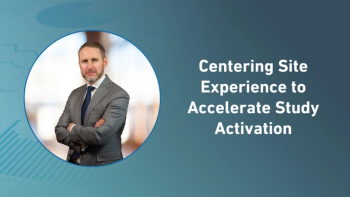
- Applied Clinical Trials-05-01-2010
- Volume 0
- Issue 0
Conversations With Study Volunteers
Patients share factors that most inform, educate, and motivate clinical trial participants.
About a year ago, I had the opportunity to meet with groups of study volunteers to learn first-hand about their experiences and perceptions. I want to share insights from my discussions with study volunteers and encourage your reactions and ideas. Among the many insights from three conversation groups held at the Piedmont Medical Group (PMG) in North Carolina: a powerful reminder of the unique and valuable relationship between study staff and study volunteers, and the revealing underlying needs of all clinical trial participants.
The Center for Information & Study on Clinical Research Participation (CISCRP) conducted a series of conversation groups in March 2009 among a convenience sample of 22 study volunteers in active clinical trials conducted at PMG. Each conversation group lasted approximately 90 minutes and had equal numbers of male and female participants, with a range of socioeconomic backgrounds and medical histories. One group had six participants under the age of 30; a second group included eight participants between the ages of 31 to 50; and a third group had eight participants over the age of 50.
The study volunteers who had completed participation in one or two clinical trials, though a few older participants were in their fifth or sixth trial. Participants in the youngest age group primarily participated in treatment studies of interventions already in use (e.g., flu and tetanus shots, contraceptives). Participants in the two older groups were more likely to have taken part in clinical trials related to their current or anticipated health problems, including obesity, diabetes, and hypertension.
A most important asset
Study volunteers readily and consistently affirm the essential role that study staff and health care professionals play in volunteer recruitment and retention. These professionals are the sole interface and the primary vehicle through which volunteers learn to trust, interact, and comply with clinical research. Attendees consistently describe their relationships with study staff as tough but fair, disciplined but supportive.
Volunteers' personal relationships with study staff greatly influence the decision to initiate and the willingness to complete participation. The overwhelming majority of conversation group participants praise the support system offered by the PI, coordinators, and administrative staff. For some, seemingly trivial actions—like a friendly face, a listening ear, and a level of concern that might have been lacking in their previous medical encounters—go far in engendering trust and the sense that volunteers are valued members of the research team. Many volunteers praised study staff for pushing them out of their comfort zone. A fresh perspective offered by a supportive but demanding network of clinical research professionals pushes volunteers closer to achieving their health and participation goals.
After their trials have ended, volunteers remain keen to paying attention to patient recruitment advertisements as a result of their positive past relationships and experiences in clinical trials. In addition, many volunteers readily refer family and friends to clinical trials based on the relationships that they have formed with study staff during clinical trials.
Universal needs
Volunteers articulate four core needs that exist across all age ranges and socioeconomic levels. Study volunteers:
- Want to feel that they are taking control of their medical condition and well-being
- Want to be personally connected to study staff
- Want to be treated as human beings
- Want to know that their participation will make a difference.
Many study volunteers recall wanting to take charge of an existing health problem but being unable to do so alone or in a traditional medical setting. Study staff and the protocol offer a methodical and controlled environment where volunteers learn to be more responsible for their health.
Although volunteers want to "take control," they do not want total independence in their efforts to improve their well-being. Control for these study volunteers means feeling that they are part of a team where each party is accountable for fulfilling his or her obligations as a PI, coordinator, site professional, patient advocate or participant.
While offering enrollment incentives initially catches the eye of prospective study volunteers, choosing whether or not to participate is a far more complex decision. Volunteers in each conversation group describe weighing many factors—such as increased control, personal or public health improvements, compensation—against the many risks of participation. But one particularly notable and unanimous theme emerged in the conversation groups: Volunteers are more likely to act on a chance to participate if they clearly understand the potential benefit to public health.
Indeed, although volunteers hope that a clinical trial may benefit them personally, they recognize that there is a high likelihood that it will not. Understanding how their participation will inform medical knowledge and benefit patients in the future resonates with volunteers as an important and meaningful contribution.
Some study conduct practices conflict with these four core needs. The promotion of study compensation and other participation incentives attract prospective volunteer attention but may cheapen and trivialize the importance of participation. In addition, the "last patient last visit" mindset widely shared by clinical research professionals ultimately leads to detachment and alienation of study volunteers.
Many trial participants feel that recruitment campaigns that emphasize monetary compensation trivialize their contribution, depersonalize the clinical trial experience, and for some, reinforce the feeling that they are specimens-for-hire. Superficial emphasis on monetary compensation and other promotional rhetoric impedes public recognition that study volunteers are part of a vital exchange in which they are compensated for sacrificing their time and committing themselves to participate in a scientific study.
Study volunteers unanimously agree that being in a clinical trial is an "unusual experience" that places them among a unique segment of the population. Most study volunteers, however, perceive that their role in a clinical trial ends with their final site visit. Most conversation group participants express feeling that their trials ended abruptly, usually with unfulfilled promises of information on either concluded or upcoming studies. Without post-trial follow-up, volunteers are left feeling unsure of the details and value of their study and of their personal gift of participation.
Education and outreach
The results of these conversation groups suggest numerous opportunities to improve public and patient education and outreach. Given the essential relationship that exists between investigative site personnel and study volunteers, sponsors and CROs will benefit greatly by routinely soliciting feedback from study staff during protocol feasibility and throughout the study. General and targeted communication that better positions study staff as partners in the recruitment process will further reinforce this essential relationship.
Pretrial education needs to do a better job of acknowledging the important ways that study volunteers help in advancing medical knowledge and public health. CISCRP's many outreach campaigns and initiatives play an active role in providing pretrial education throughout the U.S.
CISCRP was instrumental in the development of an educational supplement that reached millions of Wall Street Journal readers recently (April 23). Pretrial education should emphasize the risks and nonmaterial benefits of volunteering; give clear, consistent explanations of the key elements of participation, including research procedures and the volunteer's role; and acknowledge the value of participation to public health.
Post-trial follow-up is a pivotal moment when research centers can convey the gift that participation has provided and reinforce the profound relationship that has been established between research professionals and study volunteers. Study volunteers of all ages are eager to learn about the outcome of their particular trial. CISCRP has been actively developing and testing a new post-trial communication program that can be routinely used by sponsors and CROs to provide post-trial results to study volunteers via investigative sites.
Thank you to the Piedmont Medical Group for arranging the conversation groups. And thank you to the many study volunteers with whom I met for their invaluable insights.
Kenneth A. Getz MBA, is a Senior Research Fellow at the Tufts CSDD and Chairman of CISCRP, both in Boston, MA,
Articles in this issue
almost 16 years ago
Applied Clinical Trials Digital Edition - May 2010almost 16 years ago
Keeping Ahead of the Technology Curvealmost 16 years ago
Research Integrity Gets Boostalmost 16 years ago
EDC & EHR Integrationalmost 16 years ago
Me-Too's Strugglealmost 16 years ago
Clinical Trials for Kidsalmost 16 years ago
act supplement coveralmost 16 years ago
Health Reform Supports Biomedical R&Dalmost 16 years ago
A Patient Universealmost 16 years ago
Business and News Update May 2010Newsletter
Stay current in clinical research with Applied Clinical Trials, providing expert insights, regulatory updates, and practical strategies for successful clinical trial design and execution.




